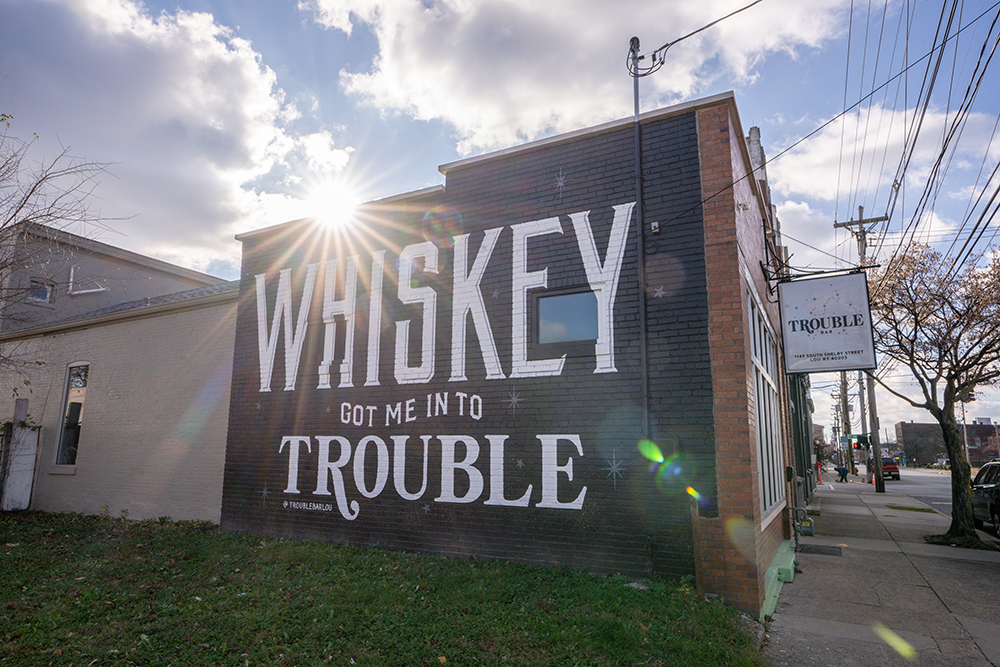Bar Scout: Trouble Bar
Louisville, Kentucky
Story by Susan Reigler; Photography by Victor Sizemore
Trouble Bar, in Louisville’s racially and economically mixed Shelby Park neighborhood, opened in 2019. In a town that has its own Urban Bourbon Trail, the bar has an excellent selection of whiskey but hardly the largest. But it may have the biggest heart.
That’s because owners Nicole Stipp and Kaitlyn Owens, conscious of the traditional white male demographic of whiskey drinkers, very deliberately set out to be “a place welcoming to everyone.”
From the choice of the location to the diversity of the staff to the bar’s name—a reference to the late Representative John Lewis’s famous social justice admonition to “Make Good Trouble”—Stipp and Owens are committed to being a neighborhood gathering place that also draws clientele from all parts of the Louisville metro area, as well as out-of-towners intent on exploring the city’s renowned bourbon scene. The atmosphere is cozy and unapologetically enthusiastic about bourbon.
Housed in a building dating to about 1910 and located on a street lined with a mix of small houses, churches, and other storefronts, it would be easy to miss were it not for giant mural painted in white on the black side wall: “Whiskey Got Me into Trouble.” How could you not stop here for a drink?
Just inside the door on the right is the Wall of Troublemakers, dozens of framed photos of activists including Lewis, of course, as well as environmental advocate Greta Thunberg, author Maya Angelou, and gay-rights crusader Harvey Milk. The wall serves as a conversation starter for many customers, and every staffer is versed in the Troublemakers’ stories. Just ask a bartender if you don’t recognize a face.
The spacious interior features exposed brick walls, subdued lighting, and conversational groupings of mid-20th Century furniture. The long bar in a back corner is lined with retro barstools covered in light-green vinyl. The first time I visited Trouble, I sat at the bar to meet a couple of friends and was immediately struck by the interaction of groups of customers with each other and with the staff. Regulars are greeted by name. Also striking was the pricing of the bar menu, a purposeful part of the inclusivity plan.
Stipp and Owens’s original business, which they still maintain, is Matson & Gilman, a bourbon tour company specializing in curated experiences and tastings. They found that much of Louisville’s bourbon tourism was located downtown and in NuLu, an area of shops, galleries, and restaurants just east of downtown.

“Many places that were doing flights were very pricey,” Owens said. “Our aim is to serve the average traveler and the neighborhood.” She and Stipp also allow local nonprofit organizations to use Trouble Bar as an event space free of charge.
The pricing philosophy is seen in the $4 beers and in 2-ounce pours that start at $4. Bourbon flights consisting of three or four 1-ounce pours range from $11 to $28, significantly less expensive than flights at most establishments.
In addition to bringing their own expertise to the flight selection, Trouble Bar’s beverage director, Felicia Corbett, invited some guests to contribute. They include Samara Rivers, founder of the Black Bourbon Society; Kelly Nicole Jones, a nearby resident and neighborhood advocate; and Peggy Noe Stevens, founder of the Bourbon Women Association. For variety, there are also gin and Scotch flights, as well as an Irish flight put together by Colin Blake, director of Spirits Education at Moonshine University, an educational distillery in Louisville that offers training for professionals as well as courses for enthusiasts.
The outstandingly creative cocktail list is curated by Corbett, who loves that Stipp and Owens support her, 100 percent. “Coming here and having Kaitlyn and Nicole say, ‘Do what you want,’ and I said, ‘Can I use this bourbon in an experiment?’ and they said ‘Yes.’ It’s been really incredible!”
Her creations incorporate ingredients such as cinnamon-
cranberry syrup, blackberry puree, eucalyptus-infused honey, cardamom, and vanilla syrup, in addition to more traditional mixers such as a variety of vermouths and bitters.
The pandemic has led to some adjustments. There is no more sitting and ordering at the bar for now; table service is provided instead. But Trouble Bar’s philosophy hasn’t changed.
It’s important to be serving a diverse community and adding to the Wall of Troublemakers, Stipp said. “I think we make a statement for the people that we care about, people that we look up to, [including] women of color. Those are clear leaders.
I think it sets the tone for what this bar is, even when Kaitlyn
and I aren’t here.”





